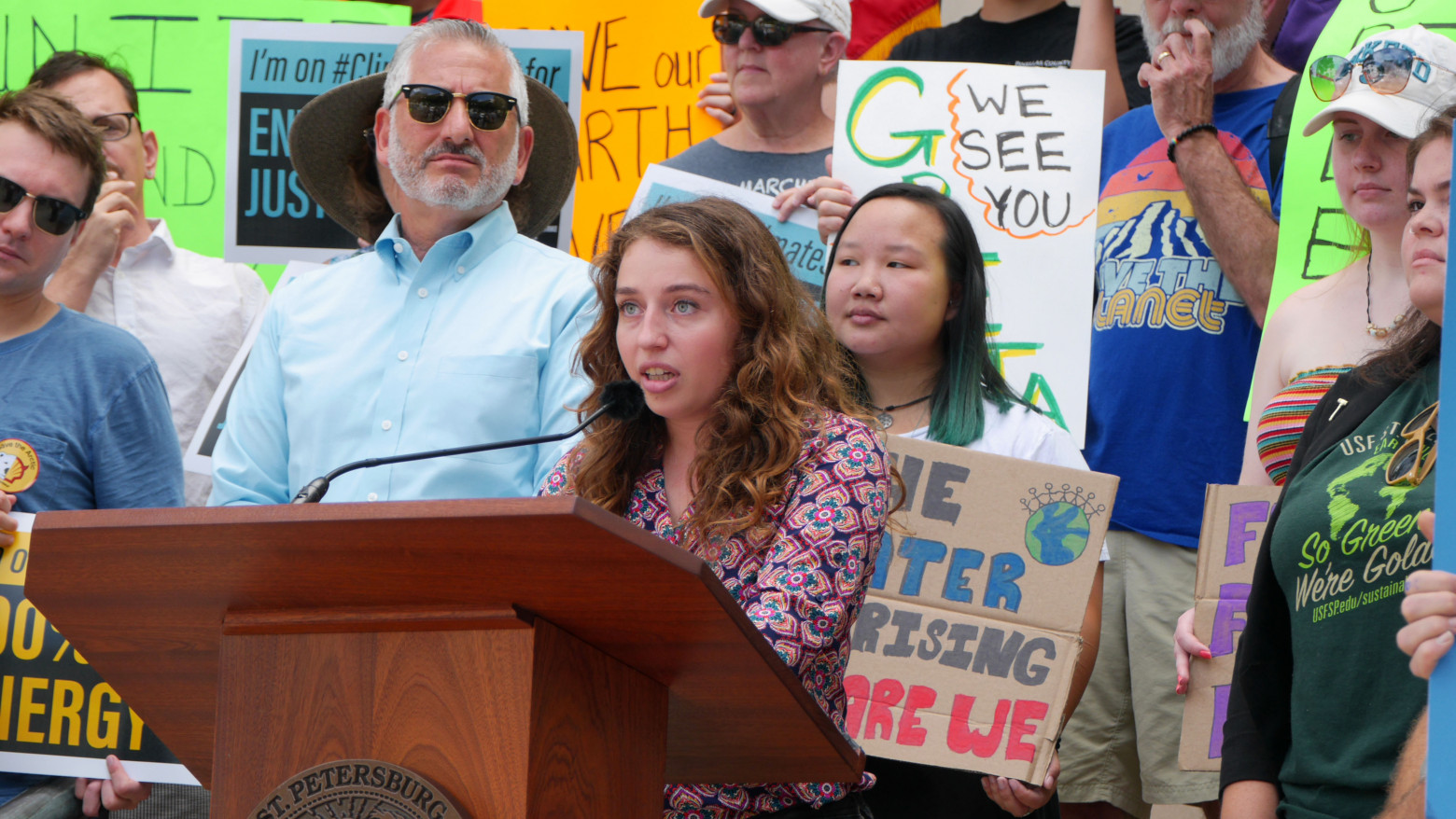
Melissa Pielet speaks at St. Petersberg Climate Strike. (Anne Orca/Eckerd College)

Melissa Pielet speaks at St. Petersberg Climate Strike. (Anne Orca/Eckerd College)
Outside of St. Petersburg’s City Hall, under the hot Florida sun, stood the speakers of the day, ready for the press conference preceding the Global Climate Strike. One of them was Melissa Pielet, an environmental studies major and marine science minor at Eckerd College. As she waited for her cue to speak, people of all generations began trickling in and gathering behind the podium with their homemade signs as the local news media set up their video cameras.
Pielet was the first speaker of the day.
“My entire life has been plagued by the words ‘now is the time to act’ but my generation cannot do this alone,” she said to the crowd, and they cheered in response.
Inspired by Greta Thunberg, the 16-year-old climate activist from Sweden famous for starting Fridays for Future, young people around the world organized local climate strikes. In this worldwide call for climate action, the city of St. Petersburg joined in on a momentous day.
Pielet was originally drawn to the issue of climate change through her love of animals and the environment. As a child in Illinois, she would regularly ask to visit the zoo, aquarium, or go to a park so she could spend time outside and observing animals.
Although far from home, she was drawn to the mystery of the oceans in particular, which is why Eckerd’s campus was an appealing option for college. The liberal arts school sits on Florida’s Gulf Coast, and on any given day you can see dolphins from the campus’s beach, making it a popular place for marine science and environmental studies students. Today Pielet stands as the president of Eckerd College’s “Scubi Jews” club, a scuba diving club facilitated by Eckerd College’s campus Rabbi. As the leader of Scubi Jews, Pielet organizes events such as waterfront clean-ups and dive for debris, where dive-certified students can help clean up the trash found at the ocean floor.
Now, looking into the crowd of faces at the climate strike, Pielet continued: “We have everything to gain from climate action and everything to lose from inaction.”
The responding enthusiasm from the crowd was infectious. That support likely comes from witnessing climate change, firsthand.
Florida faces serious impacts of a changing climate — some of which have already been felt by the intensified hurricanes and sea-level rise. Both will continue to worsen if nothing is changed.
Tourism is a large part of Florida’s economy, thanks to its beautiful beaches and other recreational opportunities, seafood, and amusement parks. Impacts of the climate crisis are an immediate threat to Florida’s economy, which is why, Pielet said, we need to talk about the money.
“There will be so many jobs if we start trying to build more green infrastructure, and renewable energy,” she assured.
The biggest roadblock? Political will, Pielet said.
One of the struggles in making progress is that many have a different idea of how to go about addressing this issue, or not addressing it at all.
“I don’t think it’s about trying to convince people that (climate change) is real or not,” Pielet said, “but it’s more so just voting them out… and voting in people who are serious about it.”
With the 2020 presidential election coming soon, addressing the issue of climate change is more urgent than ever. Many who are concerned about the environment are looking for candidates with a climate plan.
The city of St. Petersburg proves that important action can be taken at the local level, too. In April 2019, St. Petersburg adopted an Integrated Sustainability Action Plan, which outlines a blueprint for the city to be fossil fuel-free with a thriving economy by 2035. The plan includes implementing more public transportation and bike routes.
As I sat speaking to Pielet in the park while her dog zoomed around us, I noticed the determination in her voice and the purpose in her tone.
“Finally, the pressure is on,” she said.
There are many factors that make switching to a green economy complex, she explained, but it is doable — and our future depends on it.
After seeing the turnout at the St. Petersburg climate strike, where 1,200 people gathered on Sept. 20 to demand action, Pielet said, “This is the most hope I’ve ever had… this could truly be a turning point.”
We have the groundwork laid out, and now it’s just a matter of acting on it.